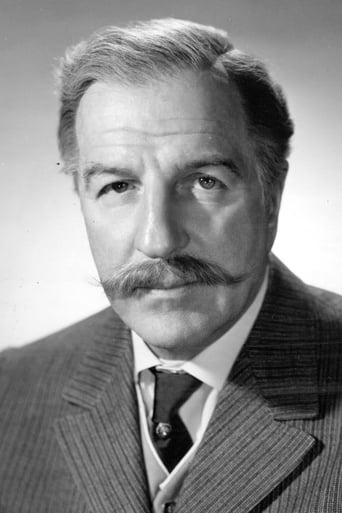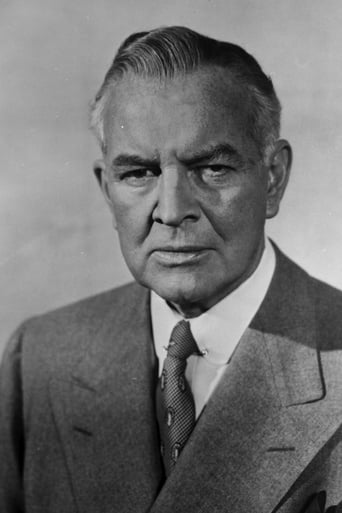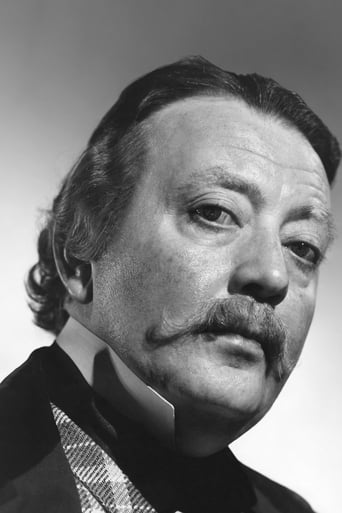ScoobyMint
Disappointment for a huge fan!
Connianatu
How wonderful it is to see this fine actress carry a film and carry it so beautifully.
Chirphymium
It's entirely possible that sending the audience out feeling lousy was intentional
riesx002
No film version can substitute for reading the unabridged version of The Count of Monte Cristo. No doubt there is no substitute for reading it in French, but for English-speakers Robin Buss' 1996 English translation reportedly captures the both spirit and letter of Dumas' novel better than previous translations. In my opinion, the 1934 film also captures the spirit of the book, but omits many characters and story lines, and adds or rewrites others. Nevertheless, this film version is fun to watch.
vincentlynch-moonoi
I'm not often a fan of British movies, so it was with some surprise that I found myself rather liking this one. It turns out this is actually an American film, with Robert Donat being imported as its star.One thing I liked about this film was the appearance of a number of character actors with whom I was more familiar in their much later roles. I've always enjoyed Louis Calhern, and this is, perhaps, the earliest film in which I've seen him (although he dates back to the silent era). I also rather like Sidney Blackmer, and this is the earliest film in which I've seen him ("Heidi" with Shirley Temple was a bit later). And Raymond Walburn, who we usually see as a comic buffoon, is here one of the villains.I appreciate Robert Donat much more after watching this film, although he was less believable as a young sailor early in the film than he was as the Count Of Monte Cristo later in the film.Elissa Landi, an actress with whom I was not familiar, was not very impressive here as the female lead. In some small way...the way in which she pouted with her mouth...was very distracting (or should I say just down right poor acting).This is a story of revenge, and a darned good one. Highly recommended, and perhaps deserving of a spot on your DVD shelf.
ev_srikrishna
Count of Monte Cristo, a splendid novel by Alexander Dumas, touching every person, every feeling, every character and every aspect of life. Hope and Despair being comparable to Light and Darkness are the main theme of the novel. It tells us not to despair in adversity but to hope for the best yet to come. It also ends up with a note that when one attains all the success in the life, he should not forget the Supreme, controlling all of us. One may think of everything is under his power. But, such a feeling is far from truth.One can compare the theme of the novel, with the wording of Lord Krishna in Bhagavadgita. Those words promulgate that, doing the activity cast upon you, is your duty. The result is in someone else's hands, for which you should not bother.Every character in the novel is specifically chosen to reflect one or more features of humankind. All the facets of human life, such as, greediness, jealousy, kindness, love, affection, courage, selfishness, misery, poverty, humbleness, integrity, intelligence, etc., are depicted in the most possible lucid manner.The ups and downs of the life, are the focal issue of the novel. A person may suddenly drop down to the earth, even without fault of his own. An innocent person can be made to suffer for something, he never committed. A person can crush the life of another human being, for the sake of his own growth and security. A person can also sacrifice and put his life in danger, for somebody.The process, thinking and evolution of a person, who was suddenly made to suffer, without fault of his is illustrated in detail. The conversion of Edmond Dante in to Count of Monte Cristo, is by no means a simple process. The agony and the misery of a person, resulted in such a conversion.The rigors of jail life are portrayed in a perfect manner. The loneliness of jail life will crush a man's belief in his own physical and physiological strengths. It will force him to despair. Anger will overcome one's rationality. One will think of all the evil to come to all those he hates or he believes to be the cause of his misery. In such a process, he loses balance and faith in God. One would think of committing suicide, losing interest in life.However, even a small or faint hope of freedom, which is so dear to such a person, would rejuvenate all his energies to focus and he comes back into life. All the energy, ability and ingenuity is focused and centralized when it comes to aspect of attaining freedom.The novel ultimately drives the reader to accept the fact that, forgiveness is supreme to punishment. As the Christ prays to His Holy Father, ' Forgive Father, for they know not what they do ' , one should ultimately come to such conviction that, hatred results in more hatred and it will end in nowhere. One should read the novel from beginning to the end, without interruption or diversion. It is not a material to have a look at and forget. A person's character is to be built upon by studying the nature and life of each person in the novel.The essence of life, viz., equilibrium in all phases of life is to be learned. One cannot fall in cases of adversity. One should not forget the Supreme, in cases of prosperity. Life of oneself or another is not in one's hands. The Supreme, controls the lives of humankind, without any bias, without any prejudice, without any compassion or without any injustice. A person should try to inculcate such abilities by making a humble effort keeping the Supreme as the model. However, in such a process one should not lose ground to put himself in place of the Supreme.As the writer himself puts, most appropriately at the end of the novel, there is hope. Only one should be able to believe in it. And, most importantly, one should be able to wait till such hope is realized.
Igenlode Wordsmith
The good news is that this turns out to be, as I hoped it might, my "long-lost Monte Cristo" -- the film I once caught the end of, thanks to the BBC, on holiday twenty years ago, and have never been able to find again since. The bad news is that, alas, the part I missed then isn't actually nearly so good as the remainder...The Reliance Pictures production of "Count of Monte Cristo" is a queer mixture of success and banality; of studio polish and poverty-row shortcuts; of efficient editing and crass musical indirection; of genuine emotional power and thumping cliché; of briskly-moving adaptation and bizarre moments of staging (revolving witness-box, anybody?) A literal version of Dumas it is not -- one would not expect it from any film spectacular of this period -- but many of the changes made are entertaining or effective, and the happy ending provided works at least as well as Dumas' rather unsatisfactory version. The meandering original is reduced to a bare two hours' running time by dint of concise scripting and cutting out most of the sub-plots involving the de Villefort and Morrel families, an attempt which is by and large successful. It works less well at the beginning, where there are simply too many unidentified characters popping up and scheming without any of them really being established properly, particularly as Morrel and de Villefort's father are then pruned from the plot, never to appear again. And de Villefort's downfall as presented here really doesn't work for me: lacking the damning evidence of infanticide, the script doesn't seem to come up with any terribly convincing alternative to turn the tables on the prosecutor. On the other hand, introduced material such as Mercedes' (completely uncanonical) aristocratic snob of a mother, or the tableaux in praise of Fernand at which Haydee accuses him, works very well.Ironically -- given the Hollywood studio's doubts as to their unknown English import's ability to pull off anything but a fresh-faced lead -- Robert Donat shines mainly in the latter half of the picture as the older, embittered and sophisticated Monte Cristo. His guileless Dantes makes little impression, for it could be any generic juvenile lead role -- the character as written is not so much naive as uninteresting. Donat fares better where he can give a sense of some hidden depths to the part, and his best features are his strong eyes and brows rather than his cheery grin. As Monte Cristo, however, he is both debonair and dangerous, an intelligent schemer with a dry wit at his enemies' unknowing expense, and he is supported ably by both Douglas Walton as the young Albert and Elissa Landi as Mercedes.It was Miss Landi's performance with which I was truly impressed here; she ages with utter conviction from the wilful girl to the resolute mother, and lends her scenes opposite Donat the real impact that is lacking from so much of the film. In a plot that has been re-angled to concentrate far more closely on the Edmond/Mercedes relationship, her role is vital, and her character provides most of the emotional engagement of the story, from light-hearted charm to heartbreak (Valentine de Villefort, here paired off with Albert, is a mere cypher in comparison).The film starts off in outright formulaic guise, from Napoleon's appearance (in full uniform and cocked hat, with his hand duly thrust in his breast 'like that') to the standard storm-at-sea sequence with water poured across the screen. It continues to suffer from crude musical underlining more or less throughout, almost sabotaging for example Donat's scene with the dying Abbe Faria, which he otherwise pulls off with conviction, while certain characters, such as Morrel and the mute Nubian Ali, appear to have been retained despite the loss of the plot elements which actually involved them (possibly as a result of cuts to the script later in filming?) Overall, however, the adaptation does a pretty good job of conveying information quickly and concisely -- Albert's entire Italian adventure is dealt with effectively in a matter of a few minutes with none of the essentials lost, and Haydee's brief role introduced without any seeming contrivance. It borrows little in practice from Dumas' wordy original save the bare outlines of its plot, and sometimes not even those; but as an initially uninspired Hollywood screen adaptation it improves considerably as it goes on. Literary fidelity isn't everything, and if it were not let down by certain sections I would have rated it considerably higher; alas, this production remains an odd mixture of the powerful and the pedestrian.





